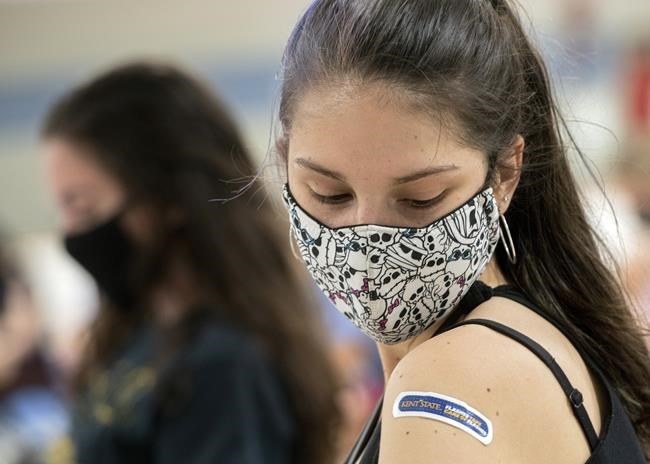COLUMBUS, Ohio (AP) — Ohio Gov. Mike DeWine is offering big lottery incentives — including a $1 million prize and college scholarships — in a last-ditch effort to get people vaccinated before the state's mask mandate and most other coronavirus-related state orders end June 2, he announced Wednesday.
All Ohio's COVID-19 orders except those applying to nursing homes and other long-term care facilities will end, the Republican said during a primetime address. However, DeWine noted that stores and businesses still may require customers to be masked.
With three weeks to go before restrictions lift, DeWine rolled out big-ticket motivators. Beginning May 26, adults who have received at least one vaccine dose may enter a lottery that will provide a $1 million prize each Wednesday for five weeks. In random drawings, the state will also provide five full four-year scholarships to an Ohio public university — including tuition, room-and-board, and books — to vaccinated Ohioans under 18.
The money will come from existing federal pandemic relief dollars, DeWine said, and the Ohio Lottery will conduct the drawings.
State Rep. Emilia Sykes, the top House Democrat, questioned the use of federal funds.
“Using millions of dollars in relief funds in a drawing is a grave misuse of money that could be going to respond to this ongoing crisis,” she said.
DeWine acknowledged the unusual nature of the financial incentives.
“I know that some may say, ‘DeWine, you’re crazy! This million-dollar drawing idea of yours is a waste of money,’” he said. But the real waste, when the vaccine is now readily available, “is a life lost to COVID-19,” the governor said.
In announcing the mandates' end, the governor cited the sharp drop in the numbers of COVID-19 cases and hospitalizations and the high vaccination rates among people 65 and older. He also said the vaccine is a “tested and proven weapon” that all Ohioans 12 and older can now avail themselves of.
“It’s time to end the health orders. It’s been a year. You’ve followed the protocols,” DeWine said. “You’ve done what we’ve asked. You’ve bravely fought this virus.”
The seven-day rolling average of daily new cases in Ohio did not increase over the past two weeks, going from about 1,522 new cases per day on April 26 to 1,207 new cases per day on May 10, according to data collected by the Johns Hopkins University Center for Systems Science and Engineering.
More than 4.2 million Ohioans — about 36% of the population — had completed the vaccination process as of Tuesday. But the number of people seeking vaccines has dropped in recent weeks, with an average of about 16,500 starting the process last week, down from figures above 80,000 in April. About 42% of Ohioans have received at least one dose.
“There comes a time when individual responsibility simply must take over," DeWine said.
Business groups uniformly praised the decision. The news “is the logical next step in fully reopening our state for Ohio’s businesses and families,” said John Barker, president and CEO of the Ohio Restaurant Association.
“Removing these barriers comes at the right time and will assist the efforts of Ohio’s business community to restore Ohio’s economy,” said Andrew Doehrel, Ohio Chamber of Commerce CEO and president.
Dr. Lisa Egbert, president of the Ohio State Medical Association, said the organization supported the announcement but urged all eligible Ohioans to be vaccinated as soon as possible.
DeWine made the announcement even though his previous goal for dropping the orders hadn't been reached. In a March 4 primetime address, the governor had said he would lift remaining mandates once the state hit 50 coronavirus cases per 100,000 people for two weeks. At the time, the figure was 179 cases per 100,000 people; it had dropped to 123 cases as of this week.
Despite DeWine's message, he had little choice in removing the mandates. His speech came only a few weeks before fellow GOP lawmakers could have voted to immediately remove all mandates, per a bill passed earlier this year over the governor's veto. That legislation takes effect June 23. House Republicans had signaled their intention to introduce a resolution Wednesday in preparation for a June 23 vote.
“There's a strong sentiment that the health orders need to be dissolved,” House Speaker Bob Cupp, a Lima Republican, said earlier Wednesday.
Senate President Matt Huffman, another Lima Republican, also said Wednesday it was time for the end of mandates.
“Ohioans care about getting their businesses open and doing other things that will allow some freedom,” Huffman said.
Also Wednesday, DeWine spokesperson Dan Tierney confirmed that employees of executive branch agencies — who have been working almost exclusively from home — would return to their offices in stages, beginning July 6.
DeWine implemented the current mask mandate in July as case numbers rose. That followed a mandatory mask order in April 2020 that he rescinded just a day later under intense criticism that the directive was “one government mandate too far.”
In addition to his daily or weekly midday briefings, DeWine previously addressed Ohioans about the pandemic in primetime speeches Nov. 11 and July 15.
Also Wednesday, a federal judge denied Republican Attorney General Dave Yost’s request for a temporary order preventing U.S. Treasury Secretary Janet Yellen from enforcing a provision of the American Rescue Plan Act that says states can’t use their recovery dollars to offset tax cuts or credits.
Judge Douglas Cole said Ohio has a strong chance of proving the tax rule unconstitutionally ambiguous. But the judge also found that granting the order against Yellen wouldn’t provide Ohio the relief it seeks, because Treasury’s rules for the money are still being worked out, the state hasn’t yet received its money and Yellen has not yet tried to recoup anything.
___
Associated Press writers Julie Carr Smyth and Kantele Franko contributed to this report.
Andrew Welsh-huggins, The Associated Press




